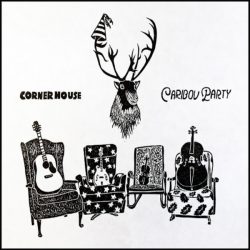A fresh take on earthy old-time string music and Celtic folk from Boston quartet Corner House
 Corner House are a young string band quartet based in New England, with Ethan Setiawan on mandolin and mandola, Louise Bichan on fiddle, Ethan Hawkins on guitar, and Casey Murray on cello. Sidenote: This is not the same Boston-based Irish folk band called The Corner House that was active in the ‘70s. This Corner House formed in 2017 in the Boston acoustic folk scene with connections to the renowned Berklee College of Music.
Corner House are a young string band quartet based in New England, with Ethan Setiawan on mandolin and mandola, Louise Bichan on fiddle, Ethan Hawkins on guitar, and Casey Murray on cello. Sidenote: This is not the same Boston-based Irish folk band called The Corner House that was active in the ‘70s. This Corner House formed in 2017 in the Boston acoustic folk scene with connections to the renowned Berklee College of Music.
Corner House’s sound is an eclectic combination of Appalachian string band and Scottish and Irish folk music, an embodiment of theories about the original Celtic source of American mountain music. They sound like players with several decades of experience or like people who grew up in these musical traditions. Hawkins’ father is a Virginian bluegrass musician, Murray is from western New York, Goshen, Indiana native Setiawan is an accomplished, award-winning mandolinist, freelance musician, and teacher, and Bichan is from Orkney. The four of them left Boston during the early COVID lockdown and holed up at a farm in rural Pennsylvania, where they unhurriedly worked on the material that became this EP in a cottage “engulfed by tiger lilies” and a barn on the property that contained old armchairs, four of which are featured in the cover art.
Only two of the six songs here feature vocals, but the other four are in no way constrained by being instrumentals. As musicians they are both technically skilled and creatively inspired. There is warmth even among the melancholy, foreboding tone of the title track ‘Caribou Party.’ The EP is a joyful, textured mixture of traditional genres. ‘The Hawk, the Hound, the Homers,’ Bichan’s composition, is a remarkable track that showcases her exceptional, incendiary fiddle playing. The gentle ‘Easter Sunday,’ while facing a feeling of dissonance about the religion of one’s background (“I want to believe in faith…I just want humans to be humane”), is not somber at all. It’s very philosophical, and rather than bitter when quoting the Gospel of John, its approach is expansive, loving, and embracing the whole world: “I believe that God so loved the world / And you should too.” There is a sense that winter has finally ended, and spring will bring redemption.
The EP’s final song, the charming ‘Snow on the Rooftop/The Fallen Squirrel,’ could be a lost classic song recently discovered in a barn or attic full of old sheet music and recordings. It ramps up into a dramatic crescendo, conveying the manic energy of a squirrel running around on a roof, then fades out instead of ending on an anticipated smashing chord.
Anyone worried about the survival of traditional string music needn’t be concerned. This EP is proof that its legacy is safe with this generation.


